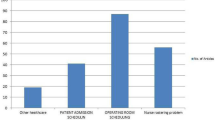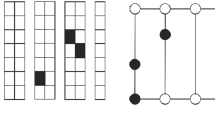Abstract
We develop a dynamic fleet scheduling model that demonstrates how a carrier can improve fleet utilization. The fleet scheduling model presented by Lee et al. (Eur J Oper Res 218(1):261–269, 2012) minimizes (1) a carrier’s fleet size and (2) the penalty associated with the alternative delivery times selected. The model is static since requests are collected over time and processed together. In this paper we present a stochastic, dynamic version of the fleet reduction model. As demand is revealed throughout an order horizon, decisions are made in stages by sampling anticipated demand to avoid recourse penalties in later stages. Based on computational experiments we find the following:
-
1.
Modeling stochasticity improves the quality of solutions relative to the analogous model that does not include stochasticity. Counter-intuitively, an order lead-time distribution in which most loads are requested early can negatively impact optimal solution costs.
-
2.
The stochastic model produces good results without requiring prohibitively large numbers of demand scenarios.
-
3.
Consignees that place orders early in the order horizon are more often assigned their requested delivery times than those who place orders late.
Similar content being viewed by others
References
Baker KR, Scudder GD (1990) Sequencing with earliness and tardiness penalties—a review. Oper Res 38(1): 22–36
Bent R, Van Hentenryck P (2003) A two-stage hybrid algorithm for pickup and delivery vehicle routing problems with time windows. In: Proceedings of the ninth international conference on constraint programming, pp 123–137
Campbell AM, Savelsbergh M (2006) Incentive schemes for attended home delivery services. Transp Sci 40(3): 327–341
Coffman EG, Garey MR, Johnson DS (1978) Application of bin-packing to multiprocessor scheduling. SIAM J Comput 7(1): 1–17
Emmons H, Pinedo M (1990) Scheduling stochastic jobs with due dates on parallel machines. Eur J Oper Res 47(1): 49–55
Gertsbakh I, Stern HI (1978) Minimal resources for fixed and variable job schedules. Oper Res 26(1): 68–85
Godfrey GA, Powell WB (2002) An adaptive dynamic programming algorithm for dynamic fleet management, I: single period travel times. Transp Sci 36(1): 21–39
Golden B, Raghavan S, Wasil E (2008) The vehicle routing problem: latest advances and new challenges. Springer, Berlin
Ichoua S, Gendreau M, Potvin JY (2006) Exploiting knowledge about future demands for real-time vehicle dispatching. Transp Sci 40(2): 211–225
Kenyon AS, Morton DP (2003) Stochastic vehicle routing with random travel times. Transp Sci 37(1): 69–82
Kleywegt AJ, Shapiro A, Homem-de-Mello T (2002) The sample average approximation method for stochastic discrete optimization. SIAM J Optim 12(2): 479–502
Lee S, Turner J, Daskin MS, Homem-de-Mello T, Smilowitz K (2012) Improving fleet utilization for carriers by interval scheduling. Eur J Oper Res 218(1): 261–269
Linderoth JT, Shapiro A, Wright SJ (2006) The empirical behavior of sampling methods for stochastic programming. Ann Oper Res 142(1): 215–241
List GF, Wood B, Nozick LK, Turnquist MA, Jones DA, Kjeldgaard EA, Lawton CR (2003) Robust optimization for fleet planning under uncertainty. Transp Res Part E-Logist Transp Rev 39(3): 209–227
Mak WK, Morton DP, Wood RK (1999) Monte Carlo bounding techniques for determining solution quality in stochastic programs. Oper Res Lett 24(1–2): 47–56
Megow N, Uetz M, Vredeveld T (2006) Models and algorithms for stochastic online scheduling. Math Oper Res 31: 513–525
Papier F, Thonemann UW (2008) Queuing models for sizing and structuring rental fleets. Transp Sci 42(3): 302–317
Pinedo M (1983) Stochastic scheduling with release dates and due dates. Oper Res 31(3): 559–572
Shapiro A (2003) Monte Carlo sampling methods. In: Ruszczynski A, Shapiro A (eds) Handbook of stochastic optimization. Elsevier Science Publishers BV, Amsterdam
Shmoys DB, Wein J, Williamson DP (1991) Scheduling parallel machines online. In: Proceedings-32nd annual symposium on foundations of computer science, pp 131–140
Smith BC, Johnson EL (2006) Robust airline fleet assignment: imposing station purity using station decomposition. Transp Sci 40(4): 497–516
Spivey MZ, Powell WB (2004) The dynamic assignment problem. Transp Sci 38(4): 399–419
Weber RR (1982) Scheduling jobs with stochastic processing requirements on parallel machines to minimize makespan or flowtime. J Appl Probab 19(1): 167–182
Author information
Authors and Affiliations
Corresponding author
Electronic Supplementary Material
The Below is the Electronic Supplementary Material.
Rights and permissions
About this article
Cite this article
Turner, J.P., Lee, S., Daskin, M.S. et al. Dynamic fleet scheduling with uncertain demand and customer flexibility. Comput Manag Sci 9, 459–481 (2012). https://doi.org/10.1007/s10287-012-0145-3
Received:
Accepted:
Published:
Issue Date:
DOI: https://doi.org/10.1007/s10287-012-0145-3




